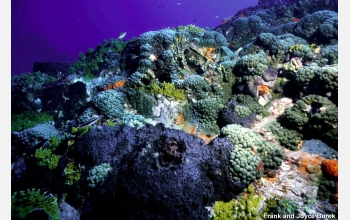
Scientists have discovered that increased levels of ocean acidity and carbon dioxide concentrations have resulted in unexpected changes in oceanic chemical processes. Their research results are published in the March 7, 2007, issue of the journal Geophysical Research Letters.
Oliver Wingenter of New Mexico Tech and his colleagues conducted a month-long field experiment. The researchers simulated present-day carbon dioxide concentrations and ocean acidity, and carbon dioxide levels expected at the end of this century and the middle of the next one. The study, funded by the National Science Foundation (NSF), New Mexico Tech and the Comer Foundation, sheds light on how chemical processes that occur throughout the world’s oceans help regulate Earth’s climate.
Other recent scientific studies have shown that ocean acidity is rising 100 times faster than ever before, Wingenter said, but this study links the effect of increasing ocean acidity to changes in phytoplankton, which themselves produce “greenhouse gases.”
“Pronounced changes in some phytoplankton have been observed during previous experiments,” said Wingenter. “The consequences for marine organisms, their ecosystems and climate-relevant gases are unknown.”
During the study, concentrations of dimethyl sulfide (DMS) and chloroiodomethane, produced by phytoplankton in ocean water, were measured.
“In the atmosphere, DMS is rapidly oxidized to sulfur dioxide, which can form sulfate aerosols in the atmosphere,” said Wingenter. These aerosols can act as nuclei for cloud formation. Increased cloudiness could block sunlight, thereby cooling Earth. “Therefore, additional DMS production in a higher carbon dioxide environment may help contribute to self-regulation of Earth’s climate.”
“The bottom line is that carbon dioxide-loading of the atmosphere could lead to environmental changes we have not even begun to think about, effects beyond acidification of surface seawater and greenhouse warming,” said Donald Rice, director of NSF’s Chemical Oceanography Program.
Combining future experimental and modeling efforts will lead to a better understanding of the feedback systems between the atmosphere and ocean, believes Wingenter. “To predict future climate more accurately, it’s critical that we understand the outcome of increasing ocean acidification and increasing carbon dioxide levels.”
Wingenter’s co-authors include former New Mexico Tech undergraduates Karl Haase and Max Ziegler, and scientists from the University of Bergen, the University of New Hampshire, the University of Kiel in Germany, and University of California at Irvine.
I have been wondering if we humans aren’t doing the earth a favor by bringing carbon back above the earth’s surface. Think about it: All of that carbon was above the surface to begin with and when those ancient plants/animals died, the ecosystems lost all of that carbon. Furthermore, the earth has been in a 3 million year cooling cycle, and we could be helping to stabilize the temperature by adding our global warming. Just a thought.
We should study the effects of the increased acidity on the plankton which absorb carbon dioxide. If this acidity causes lower numbers in plankton, then we may see a spiral down effect, because less plankton means less carbon is being taken out of the atmosphere, therefore increasing the acidity in the oceans and all of ocean life as well as life on the planet is doomed.